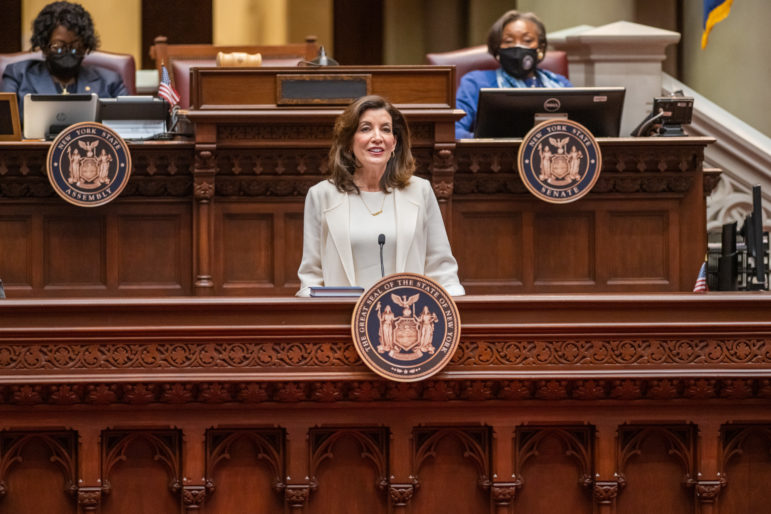Hochul, who became the state’s first female governor after former Gov. Andrew Cuomo resigned in 2021, has worked hard to distance herself from her predecessor, and from what she has described as a toxic working culture in the Capitol.

Darren McGee/Governor’s Office
Gov. Kathy Hochul during her wide-ranging, first State of the State address Wednesday.In her first state of the state address on Wednesday afternoon, New York Gov. Kathy Hochul outlined some of the more than 200 proposals that make up her policy agenda for the coming year, a plan she said was aimed at improving and investing in health care, strengthening the state workforce, and extending relief to small businesses and property owners.
Hochul, who became the state’s first female governor after former Gov. Andrew Cuomo resigned amidst scandal in August, has worked hard to distance herself from her predecessor, and from what she has described as a toxic working culture in the Capitol.
“For too long, Albany’s executive and legislative branches were fighting each other,” she said.
“We’ll do things differently,” Hochul, who previously served as Cuomo’s lieutenant governor, added. “From now on, we’ll share success. We’ll find common ground. We’ll restore trust in this government, because it’s been eroded for far too long. And we will fight like hell—not for turf, not for credit. But for New Yorkers.”
In her remarks Wednesday, the governor also said she was introducing a proposal to cap terms in statewide office at two, part of her push to bolster flagging trust in government. “For government to work, those of us in power cannot continue to cling to it,” she said. “We need to continually pass the baton to new leaders with different perspectives and fresh ideas.”
Proposed reforms also include a ban on outside income for statewide officials, “because our only job should be to serve the people of New York,” Hochul said.
Hochul, who is seeking re-election in June, also wants to eliminate the Joint Commission on Public Ethics (JCOPE), the troubled government watchdog body, and replace it with an ethics enforcement entity “with real teeth, one that answers to New Yorkers and not politicians.”
Below are some of the plans proposed by the governor in Wednesday’s speech—view her full agenda here—and some initial reactions.
Health care and the pandemic: Stemming the “current hemorrhaging of health care workers” with retention bonuses of up to $3,000; making it easier for doctors and nurses licensed to practice in other states to work in New York; free tuition and stipends for those training for health care jobs, provided graduates remain in the state; a $10 billion investment in healthcare.
Unions for some health care workers reacted favorably to the governor’s plan.
“The Governor’s pledge to invest $10 billion in higher wages, better hospital conditions, and a more robust pipeline of workers is a huge step forward and essential for protecting the health and safety of the public,” said a statement co-authored by the New York State Nurses Association. “This proposed massive infusion of resources could not have come at a more critical moment. Skyrocketing cases have pushed our healthcare system to the brink of collapse. Morale is at rock bottom, thousands of health care workers are quitting their jobs in despair, staffing levels are dangerously low, and hospital conditions are deplorable.”
Education and schools: Enhanced efforts to recruit and retain teachers, including incentives for retired teachers to return to classrooms; grant programs aimed at getting more mental health professionals in schools, which the governor said would “help heal the wounds inflicted during the isolation of remote learning”; making SUNY “the best statewide public higher education system in the nation” by recruiting world-class faculty to SUNY and CUNY institutions, and, quite notably, providing childcare on each campus. Her agenda also includes making tuition assistance available to part-time students at SUNY and CUNY schools, and increasing enrollment in the SUNY system—which has seen student numbers decline over the last decade—to at least 500,000* students by 2030.
Housing and homelessness: “Every New Yorker deserves access to affordable housing, whether they’re at the risk of homelessness, or simply struggled to pay the rent on time each month,” Hochul said Wednesday, announcing a $25 billion five-year plan to create and preserve 100,000 affordable homes in the state, including 10,000 units with supportive programs for high-risk groups like runaway youth and the formerly incarcerated.
In a statement released after the Governor’s speech on Wednesday, advocates at Make The Road NY, which works with immigrant and low-income families in the state, said they were “disappointed that Governor Hochul’s speech failed to include many transformative policy ideas for which immigrants, Black and brown New Yorkers have been calling,” included funding for workers excluded from federal relief, full access to health care for immigrants, and increased tenant protections. The state’s eviction moratorium, which advocates say has helped keep tens of thousands of renters in their homes during the pandemic, is slated to end Jan. 15.
“While we are pleased by the Governor’s commitment to increase funding for some immigrant services, create a new Office of Language Access, and legalize accessory dwelling units, these measures simply are not enough to meet the scale of the needs we face,” Make the Road’s statement said.
Workforce development: “Our goal is for New York to be known nationally as the place that grows and attracts the talent, and the businesses will follow. And for businesses to succeed, they need a well trained and educated workforce,” Hochul said. She has proposed moving the state’s workforce development office under the auspices of Empire State Development, to build “stronger” relationships with employers and move funds through the state’s Regional Economic Development Councils. Hochul is also proposing a new “Jails to Jobs” initiative to support those leaving state prisons, and said she wants to end a three-decade ban on tuition assistance for incarcerated New Yorkers.
The Partnership for New York City, which represents big businesses and employers, lauded Gov. Hochul’s plan Wednesday.
“Governor Hochul’s first State of the State message demonstrates that she is prioritizing the issues that matter most to New Yorkers as we struggle to emerge from the pandemic: health, safety, and financial security,” said Kathryn Wylde, president of the Partnership for New York City. “Her workforce development initiatives are aimed squarely at the population that needs new skills to succeed in the post-pandemic digital economy. Employers are ready to step up in support of her plan to embed training and hiring programs in the state’s economic development agenda.”
Infrastructure: “Today I’m announcing a bold idea,” Hochul said. “Take an old, unused 14-mile long runway and create what we’re calling the ‘Interborough Express,’ a new rail service that will connect Brooklyn and Queens.” The governor said she is directing the MTA to immediately begin an environmental review for the project. Ambitiously, she’s also backed plans to “reverse the damage that was done more than half a century ago with projects like the Kensington Expressway in Buffalo, I-81 in Syracuse, the Inner Loop in Rochester, and the Cross Bronx Expressway,” highway projects that bisected neighborhoods around the state. The Hochul administration also says it will invest $1 billion into the state’s “digital infrastructure,” connecting more New Yorkers to high-speed internet.
Some transit advocates, in remarks Wednesday, celebrated the Interborough Express plan.
“Governor Hochul’s proposed Interborough Express would dramatically improve access to the city for millions of people in Brooklyn and Queens,” said the Riders Alliance. It’s a major advance toward transit equity and a critical tool in the fight against climate change.”
Tom Wright, president of the Regional Plan Association—which has for decades advocated for improved outer borough rail connections—issued a similar statement, saying Wednesday “We are especially pleased to see Governor Hochul propose the Inter-borough Express, which will utilize existing railroad tracks to create new transit services in Brooklyn and Queens—and has long been a priority for RPA.”
“And we applaud her commitment to the Gateway Program, 2nd Avenue Subway, and fixing Penn Station along with the transformation of the Cross Bronx Expressway—all of which will propel our recovery while improving access, equity and connectivity,” Wright added.
Climate change: “This is a threat to our way of life here and now,” Hochul said of climate change. Her administration will embark on a “nation-leading” $500 million investment in offshore wind energy, she added, one that will create thousands of jobs. “Protecting our environment is personal to me,” said Gov. Hochul, who grew up in Hamburg, a town outside of Buffalo near Lake Erie.
“I was born at a time and in a place where orange smoke billowed out of the factory smokestacks, literally blocking the skies, with a horrible stench I can still recall to this day, all the while dumping toxic waste into one of the world’s largest freshwater lakes,” she said. “I lived surrounded by the causes of climate change. And now I’m living with the effects.”
*Editor’s note: This line was updated after publication to clarify that the 500,000 enrollment goal was specific to SUNY.










One thought on “In First State of the State, Gov. Hochul Pledges ‘New Era for New York’”
Is it state policy to replace the words illegal alien with immigrant